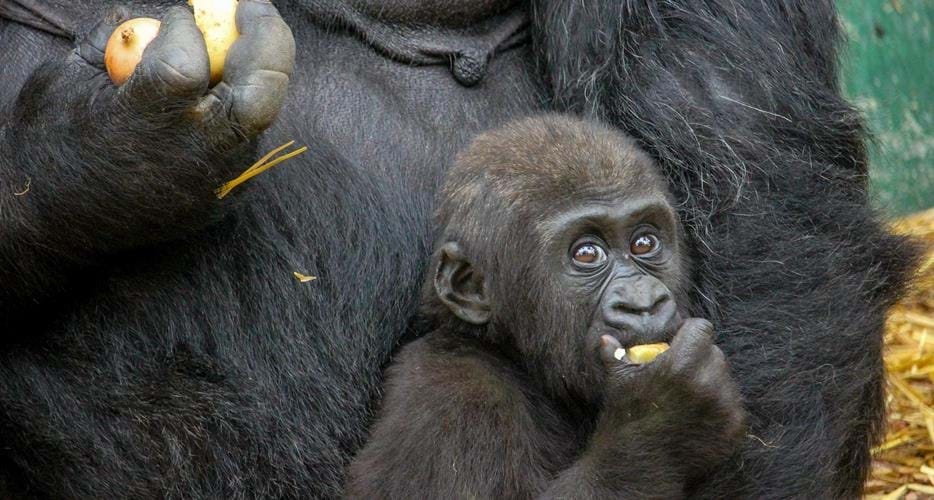Gorilla gorilla gorilla
IUCN Status: Critically endangered
At Port Lympne we have 3 groups of Western lowland gorillas. The Palace of the Apes houses a family group comprised of a silverback, adult females and young males. We also have a group of bachelor males living in 2 separate areas away from the family group.
All gorillas (of which there are 4 sub-species) are Critically Endangered. There are now only 95,000 Western lowland gorillas, 90% less than 10 years ago, due to poaching for “bush meat”, habitat destruction through logging and farming, and diseases like Ebola.
Between Port Lympne and our sister park Howletts we have had 149 births since our first in 1975.
Want To Know More
Gorillas are the largest of the great apes with adult males (known as silverbacks because of the grey hair over their backs) sometimes weighing over 200kg. Adult females are generally half that weight.
Gorillas live in family groups consisting of one adult male, several adult females and their offspring. Females usually give birth to one baby after a gestation of around 8 ½ months (twins have occurred in captivity). Infants are weaned around 3 years old.
Western lowland gorillas come from central West Africa living in dense forests and swamps of Gabon, Cameroon, Congo and Equatorial Guinea. They are predominantly vegetarian eating a variety of leaves, fruits, shoots etc. but have been observed eating ants and termites. They spend most of the day foraging for food.
Working with the Aspinall Foundation, Howletts and Port Lympne have pioneered the release of captive born gorillas into the wild. Baby gorillas orphaned by the bush meat trade in these countries have been raised by the Aspinall Foundation and taught how to survive in the wild. These orphans, and the captive born gorillas, are released into reserves covering over a million acres of Congo and Gabon which the Aspinall Foundation helps protect and manage. This project has given a safe home to over 50 gorillas, which have had more than 30 babies, and to all the other wildlife living alongside them.
Bachelor groups
A bachelor group is a collection of male-only gorillas, and is a more social alternative to male gorillas living in solitude.
Young males are kept with their families for as long as possible, and usually do not join the bachelor group until they are 10 or older. These males are in their teenage phase, so the dynamic of the group can change rapidly as they mature and try to assert their dominance.
It may be that some males will spend a few hours a day with the others in the group, and the rest of the day on their own. Sometimes they get on well, other times they simply tolerate each other!
Bachelor groups are tricky to establish, and can be less harmonious than family groups, however once the group is established, the gorillas learn valuable social skills and have companionship.
Come and meet the family!
We’re home to over 700 animals, including the largest herd of black rhino in the UK, western lowland gorillas, Kent's only spectacled bears, tigers, lions, leopards, wolves and so much more!
Buy your tickets

